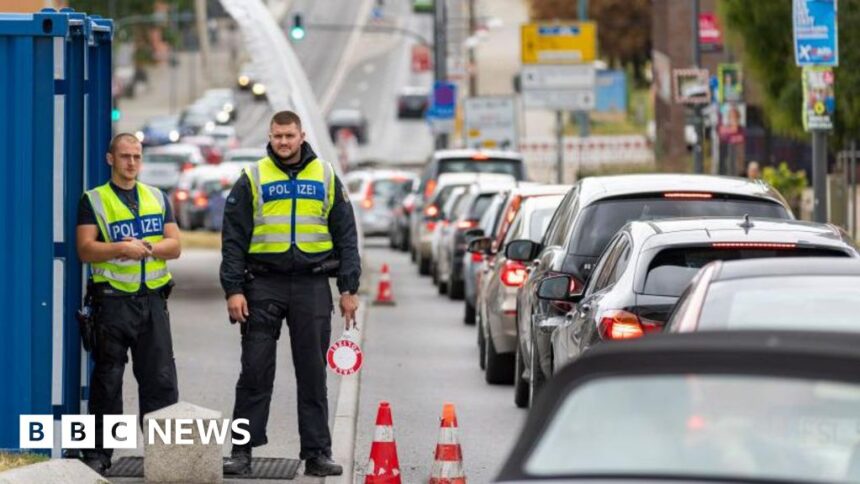Polish Prime Minister Donald Tusk has denounced as “unacceptable” Germany’s resolution to increase short-term controls to all its land borders as a part of its response to irregular migration.
He’s one in all a number of figures from neighbouring nations to criticise the transfer. Restrictions already in place at a few of Germany’s land borders will apply from subsequent Monday with France, Belgium, the Netherlands, Luxembourg and Denmark.
The top of a Dutch-German alliance of border communities mentioned it was a “panic response”, whereas Austria’s inside minister confused it could not be soak up anybody turned away by Germany.
Nevertheless, Germany’s opposition conservatives mentioned Berlin had not gone far sufficient.
The three-parties in Chancellor Olaf Scholz’s authorities have come underneath rising stress to reply to poor ends in state elections in japanese Germany the place immigration was the largest situation.
In Thuringia, the far-right Various for Germany got here first, and one other election is on the horizon in lower than two weeks in Brandenburg.
The migration debate has been ignited by the killing of three individuals at a pageant in Solingen in western Germany the place a Syrian failed asylum seeker who ought to have been deported was arrested.
The conservative CDU/CSU events mentioned initially they might participate in a migration summit of the federal government and state leaders on Tuesday, aimed toward reaching an settlement on the subsequent steps.
However they pulled out, accusing the federal government of not taking severely conservative proposals to reject asylum seekers on the border.
“Clearly the federal authorities is hopelessly divided internally and can’t agree on efficient measures,” mentioned CDU chief Friedrich Merz.
Germany and all its neighbours are a part of the Schengen border-free zone and underneath European Union guidelines short-term controls are allowed “as a final resort measure, in distinctive conditions” for as much as six months.
German Inside Minister Nancy Faeser defined the expanded controls would shield towards the “acute risks posed by Islamist terrorism and severe crime”.
Beneath her plan put to the 16 German states, police would examine whether or not an asylum seeker had already sought safety in one other EU nation and swiftly begin proceedings to ship them again if that they had.
Nevertheless, Poland’s prime minister was in little question that the measures had been triggered by “the interior German political scenario… and never our coverage in direction of unlawful migration at our borders”.
Poland has confronted a surge in unlawful migrant crossings over its border with Belarus since 2021 which it considers a part of a “hybrid struggle” waged by each Belarus and Russia. Lots of the migrants head for Germany.
Donald Tusk advised a gathering of Polish diplomats in Warsaw he would ask for pressing consultations with all of the nations affected.
European Fee spokeswoman Anitta Hipper mentioned any reintroduction of border checks needed to be carried out according to the Schengen code, so whereas Germany’s measures had been doable, “these controls should be obligatory and proportionate”.
In Austria, the place the far proper is main the opinion polls forward of 29 September elections, Inside Minister Gerhard Karner mentioned that he had instructed the pinnacle of police to not take anybody again who had been rejected by Germany.
“There isn’t any leeway,” he advised the Frankfurter Allgemeine Zeitung.
The mayor of a Dutch border city, Joris Bengevoord, mentioned the border area with Germany had already skilled delays in the course of the Euro 2024 soccer championship over the summer season, when Germany imposed short-term border checks.
“At some border crossings, ready occasions had been as much as half an hour,” mentioned Bengevoord, who’s chairman of the Euregio alliance of German and Dutch border cities.
Dutch transport group TLN accused Germany of undermining the Schengen settlement.
Some political leaders on the proper within the Netherlands have taken a special view.
“If Germany can do it, why cannot we?” requested Geert Wilders, whose anti-immigration, far-right Freedom Get together got here first in final 12 months’s Dutch elections and is now a part of the federal government. “So far as I am involved, the earlier the higher.”
Dilan Yesilgöz of the centre-right liberal VVD was additionally eager on the “super-interesting” German plan. It despatched a message that the federal government wished management, she mentioned, even when political symbolism by itself was of little assist.






